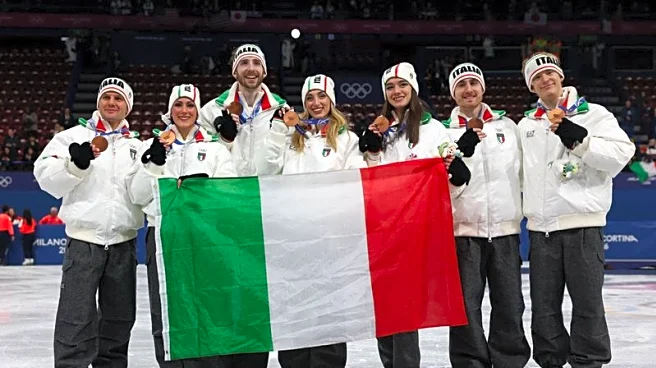What's Happening?
William Franklyn-Miller, a British actor known for his roles in 'Medici' and 'Neuromancer,' is preparing for his lead role in 'Young Washington,' a film currently in production. He attributes his readiness for this role to his experience working on the Chinese WWII epic 'Dongji Rescue,' directed by Guan Hu and Fei Zhenxiang. The film dramatizes the Lisbon Maru incident of October 1942, where Chinese fishermen rescued British prisoners of war. Franklyn-Miller played a British medic in the film, which required him to adapt to challenging conditions, including language barriers and physical demands such as underwater sequences. The production took place on Dongji Island, adding emotional depth to the project due to its historical significance.
Why It's Important?
Franklyn-Miller's experience on 'Dongji Rescue' is significant as it highlights the cross-cultural collaboration in filmmaking and the actor's growth in handling complex roles. The skills and lessons learned from working in a high-budget, international production have prepared him for leading roles, such as 'Young Washington.' This transition marks a pivotal moment in his career, showcasing the impact of diverse experiences on an actor's development. The film industry benefits from such collaborations, fostering global storytelling and cultural exchange, which can influence future projects and casting decisions.
What's Next?
As Franklyn-Miller steps into the lead role in 'Young Washington,' he will likely draw on his experiences from 'Dongji Rescue' to navigate the challenges of portraying a historical figure. The film's production will continue, with potential insights from his previous work influencing his performance. The success of 'Dongji Rescue' in China and the UK may also open doors for more international collaborations, potentially affecting casting choices and production strategies in future projects.
Beyond the Headlines
The experience on 'Dongji Rescue' not only shaped Franklyn-Miller's acting skills but also highlighted the importance of adaptability and communication in international film productions. The language barrier and physical demands required creative solutions, emphasizing the role of non-verbal communication and teamwork. This experience underscores the evolving nature of the film industry, where actors must be versatile and open to diverse cultural influences, potentially leading to more inclusive and varied storytelling.











